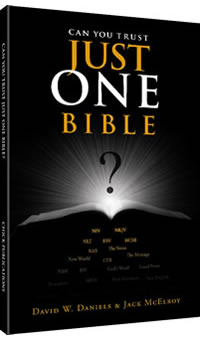Are God's words preserved in a 17th century book?

Watch the Video
Return to "Answers For KJV Critics"
See the entire video series on YouTube
Jack: What about, “It’s a 17th century book. Where’s a verse in the Bible that says He’s ever gonna preserve His words in some 17th century book that was created by Anglicans?”
What would you say to that?
David: Go to Nehemiah chapter 8, when Nehemiah, in that book of Nehemiah, after the walls were put together and people are back in their place safely. And Ezra comes back, the scribe and priest. And they come and they read the scriptures to the people who have been in Babylon for 70 years plus. They don’t know the Hebrew as well as they could. Does he dumb it down? Did he give them an alternate text? Or does the text tell us exactly what happened? You can get it out yourself. What did he do? They sent Levites, teachers, throughout the people, to tell them the sense of what was being said. They didn’t change a word. They spoke the words exactly the same, but then helped people to come up to speed about the meaning.
That’s why I wrote the Bible Companion. The King James Bible Companion was written for one simple reason: so you sit there, forever you have to use this book? No! So that you get reacquainted with what culture has been pulling out – and that’s the vocabulary of the King James Bible. So you’ll get reacquainted with the words, and they’re no longer archaic to you, are they? Because you’re using them on a regular basis. You know what they mean. You can give it to somebody else, if you want to, at that point. The idea is that you bring people up in understanding, not dumb it down by changing what God said.
Jack: And that King James Bible Companion is available from Chick Publications? It’s inexpensive to, as well, I think. I don’t know..
David: Yeah, it’s under 60 cents I think.
Jack: Yeah, 60 cents. [Actually, it’s 49 cents as of 2015].
And you guys have put out how many thousand?
David: Over 645,000 I think.
Jack: Imagine that. It’s really good.
I have a number of copies of those, and that was why I got them for my kids and so forth. So you can do the same thing. And, really, it has all the difficult words that everybody keeps talking about.
No matter what field you are in, or even any Bible you read, you still have to have some sort of a dictionary. So it seems to be a spurious argument anyway.
David: And if I can throw in one more thing. When Jesus was at the synagogue, and He opens the scriptures, again, He didn’t look and say, “You know, this is an old word. Let me substitute another word today for you.” Of course not. Because when you’re reading God’s words, and He does it right the first time, why would He need to do it a second time?
Jack: And notice in the scripture how He always talks about “the book.” The book. “The book of the law,” and so forth. They found “the book.” The Lord is always talking about a book, not about a bunch of random, scattered pieces of paper that are all over the place. “Oh, can you get me the scroll that is over there, and the half a scroll that’s there? And let’s all put them together.” Nuh-uh. They were all in a book. As a matter of fact, Moses took “the book” and put it in the side of the ark.
David: That’s right. You said it right there, where the Levites could get ahold of it, and then make it accessible for the future king, who would then sit, and have to, under their supervision, copy every letter.
Jack: Wow. Isn’t that something?
- See more articles on related topics:
- Bible Versions
- Bible Translation
- History of Preservation
Products of interest:
-

Can You Trust Just One Bible?
160 pages
Answers to the most common anti-KJV accusations. -

51 Reasons Why The King James
224 pages
Here are 51 reasons to trust that God kept His promise to preserve His own words. -

Is The "World's Oldest Bible" a Fake?
352 pages
Here is proof that the Sinaiticus, a supposedly ancient Bible text on which modern Bibles are based, is actually a 19th-century fake. -

Look What's Missing!
256 pages
For years, publishers have been removing words, and even whole verses, from modern Bibles. What's missing from your Bible? Take a look!
